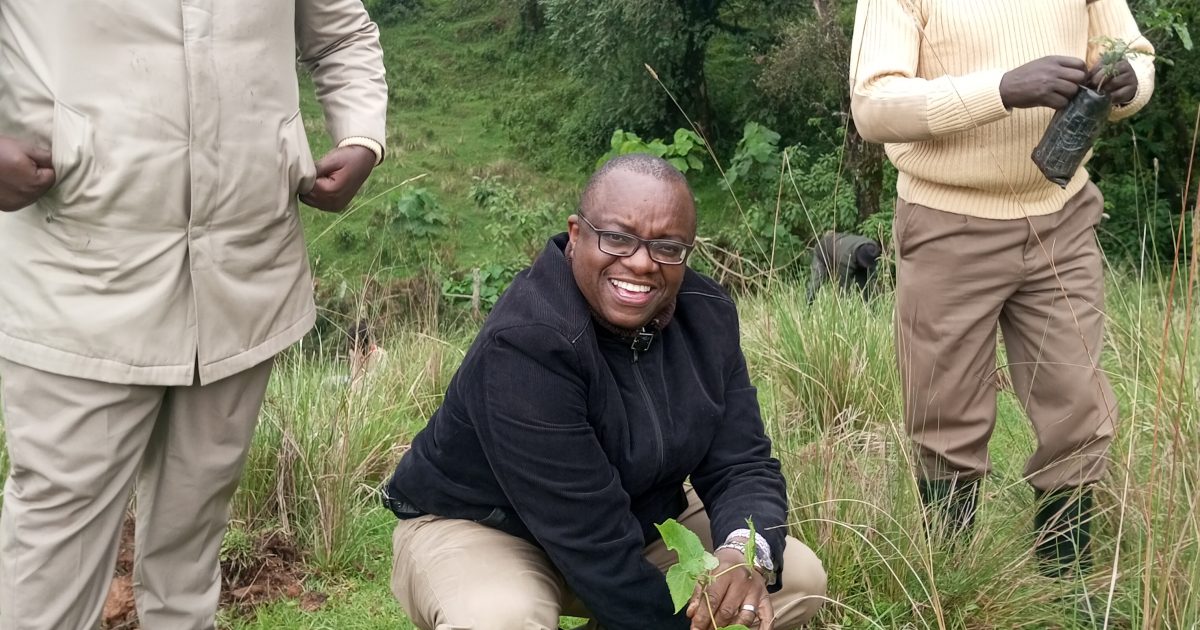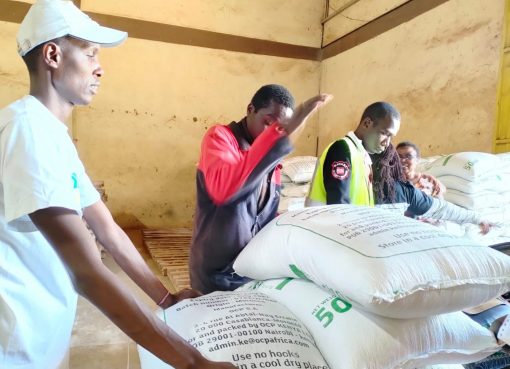The Public Health Department of the Ministry of Health has intensified tree planting exercise in West Pokot County as part of its broader efforts to promote afforestation, which aligns with the presidential directive to plant 15 billion trees across the country by the year 2032.
Speaking at the Kenya Forest Service station located in Kabichbich village, Pokot South Sub- County, a Senior Deputy Secretary at the Ministry Mr. Mawira Mungania stated that the tree planting initiative aimed at promoting community involvement and enhance awareness regarding the essential functions of trees in maintaining ecosystems, enhancing air quality, and offering shade and resources.
He noted following the presidential directive, the Ministry of Health has been tasked with the goal of increasing tree planting efforts in West Pokot and had set an annual target of planting 280,000.
He emphasized that the tree planting initiative was designed to not only improve environmental sustainability but also address climate change, enhance air quality, and foster biodiversity.
“This initiative marks a crucial advancement in the pursuit of the national objective of fostering a greener and more sustainable future for all citizens of Kenya,” he stated.
He encouraged the County residents to adopt the practice of planting native trees, emphasizing their crucial advantages in combating climate change.
“Indigenous trees are known for their adaptability to local ecosystems, providing essential habitats for wildlife and supporting biodiversity. Additionally, they play a vital role in carbon sequestration, helping to mitigate the effects of climate change by absorbing carbon dioxide from the atmosphere,” said Mungania.
The health official emphasized the strong relationship between tree planting and public health, asserting that a clean environment was directly linked to enhanced health outcomes.
“When trees are planted, they help purify the air, reduce pollution, and enhance overall ecosystem health. As a result, this leads to a decrease in the transmission of serious diseases,” he said.
Mungania encouraged the locals to adopt tree planting as a regular practice in their environment, emphasizing the importance of fostering a culture of sustainability.
He further stressed that tree planting exercise is a crucial initiative and there was need for the community to actively participate in the efforts and ensure that the newly planted trees are well protected until they mature.
Moreover, Mungania encouraged local communities to plant fruit trees which would not only provide nutritious fruits that could enhance the health and well-being of residents but also serve as a means to improve their economic situation.
He urged the youth, mothers, and social groups to come together in establishing tree nurseries, emphasizing that the collaboration would not only benefit the community but also play a crucial role in the successful implementation of the tree planting exercise in the region.
“By working collectively, the groups can cultivate various tree species that are well-suited for the local environment, ensuring a successful afforestation initiative,” he said.
In a proactive step towards promoting afforestation, Mungania urged the Ministry of the Interior and Local Government, along with the county government, to identify farmers engaged in tree nursery operations for they have a plan to source locally grown seedlings as they intensified tree planting exercises in the region.
“By engaging and supporting local tree nursery farmers, the programme would not only ensure a steady supply of high-quality seedlings but also boost the local economy and encourage sustainable agricultural practices in the region,” he said.
West Pokot County Chief Officer in the Ministry of Water, Environment, Natural Resources, and Nature Leonard Kamsait highlighted the county government’s commitment to ensuring the success of the tree planting initiative.
He stated that the local administration has collaborated closely with the Ministry of Health to implement strategies that will guarantee a 100% survival rate for the trees planted.
Kamsait stated that they were particularly concentrating their tree planting efforts in the Cherangany Hills and Leland Ward, which are recognized as significant water towers in the county.
“Cherangany Hills and Leland Ward areas play a crucial role in water catchment and provide vital ecosystem services,” Chief officer Kamsait disclosed.
He advised the local community against the unlawful practice of tree cutting, emphasizing that such actions would present considerable risks to the environment, including soil erosion, loss of biodiversity, and adverse effects on climate change.
According to County Forest Conservator Benjamin Koree, West Pokot County has been tasked with the ambitious goal of planting ten million trees each year as part of the national afforestation initiative.
He emphasized that the Ministry of Health was one of the key ministries designated to contribute to the tree planting initiative within West Pokot County.
Koree announced that the Ministry of Health, through the Department of Public Health successfully planted 10,000 seedlings as part of the intensified tree planting exercise in West Pokot.
“Among trees planted, 6,000 are indigenous species, while 4,000 are non-native or foreign varieties,” he stated.
Koree emphasized that this initiative was aimed at combating the challenges posed by climate change in the region.
“We believe that planting these seedlings will significantly help in combating the challenges of climate change experienced in the area,” maintained Koree.
He congratulated the county government for successfully preventing deforestation in the region, noting that no cases of tree-cutting activities had been reported.
He encouraged the local government and residents to continue promoting tree planting campaigns during any hosted events, emphasizing the importance of fostering a culture of sustainability.
“We encourage everyone to consider setting aside a space for tree planting during any significant events, such as weddings or celebrations. Establishing a tree planting tradition not only creates a lasting memory of the occasion but also contributes positively to the environment. Each tree planted serves as a symbol of growth, love, and commitment, and it allows you to leave a legacy for future generations,” said Koree.
By Anthony Melly and Agneta Chebet





